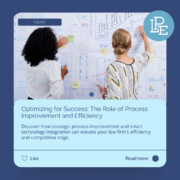In today’s competitive legal landscape, mentorship in law recruitment has become essential for law firms striving to attract top talent beyond offering a lucrative pay-check. As candidates increasingly prioritize professional growth and development opportunities, law firms must adapt their recruiting strategies to meet these expectations. One of the most effective ways to appeal to ambitious legal professionals is through robust mentorship programs. Mentorship not only plays a crucial role in attracting candidates but also significantly impacts talent development and retention.
Attracting Candidates with Mentorship Opportunities
For many legal professionals, the prospect of a mentorship program signals a firm’s commitment to its team’s career advancement and personal growth. A well-structured mentorship program can be a powerful tool in a law firm’s recruitment arsenal, setting the firm apart from competitors. It demonstrates a nurturing culture that values continuous learning and professional development, appealing to candidates who are not just looking for a job but a place to grow and thrive.
Mentorship programs provide a clear path for career progression, which is especially appealing to younger lawyers who are striving to make their mark in the legal field. These programs can help demystify the path to success within a firm, providing newcomers with the guidance and support they need to navigate their new environment and advance their careers.
Implementing Effective Mentorship Programs
Creating a mentorship program that truly adds value requires thoughtful planning and commitment. Here are key steps to developing a program that not only attracts talent but fosters long-term development and retention:
Define Clear Objectives
Start by identifying what you want the mentorship program to achieve. Whether it’s improving skill sets, increasing retention rates, or enhancing firm culture, having clear goals will guide the program’s structure and content.
Match Mentors and Mentees Carefully
Effective mentorship relies on strong, compatible matches between mentors and mentees. It’s essential to consider personalities, career goals, and areas of expertise when pairing individuals. To enhance these considerations, we have found DiSC to be a helpful additional tool. DiSC aids in understanding and aligning behavioral styles, which can significantly improve the matching process, leading to more meaningful relationships and impactful guidance.
Provide Training for Mentors
Mentoring is a skill that can be developed. Providing mentors with training on how to be effective guides can enhance the value they bring to their mentees. This training can cover communication techniques, goal-setting strategies, and ways to provide constructive feedback.
Set Expectations and Goals
Both mentors and mentees should have a clear understanding of the program’s expectations and their roles within it. Encourage them to set individual goals for what they wish to achieve through the mentorship, which can include skill development, networking opportunities, or career advancement objectives. If you have developed a well defined partnership track for your attorneys, this can help to easily guide individuals through goal setting for career progression (we can help with this).
Monitor Progress and Gather Feedback
Regular check-ins with both mentors and mentees help ensure the program is meeting its objectives. Solicit feedback to identify what’s working and areas for improvement. This iterative process is key to refining the program over time.
Foster a Culture of Mentorship
Mentorship should be a core part of the firm’s culture, not just a program. Encourage a firm-wide ethos of guidance and support, where everyone, regardless of rank, is open to sharing knowledge and experience. In an industry where time is short, mentoring can be a hard sell if it isn’t a core part of your firm’s culture. Consider ways to give credit for time spent mentoring (the billable hour is important, but so are many other things that contribute to your firm’s overall success).
How We Can Help
Understanding the pivotal role mentorship can play in recruiting and retaining talent, our leaders are equipped to help you develop and implement a mentorship program tailored to your law firm’s unique needs. We work closely with our clients to design mentorship programs that not only attract but also nurture and retain top legal talent, ensuring a thriving, dynamic work environment. Through resources like our Legal Management Exchange community, we provide additional support for these programs, offering training and development tools to enhance the effectiveness of your mentors and foster a supportive, engaging culture. Mentorship programs are more than just a recruitment tool; they are a cornerstone for fostering a development-focused culture within law firms. By investing in mentorship, firms can attract ambitious candidates, enhance their professional growth, and, ultimately, retain their most valuable asset—talented legal professionals.
Take the first step towards transforming your law firm’s future—connect with us today and discover how we can help you develop and implement a transformative mentorship program and drive your firm’s success.





 In an increasingly complex and competitive legal marketplace, law firms are recognizing the necessity for more business-oriented strategies. Gone are the days when reputations alone could guarantee a steady stream of clients. In today’s environment, strategic planning – the art and science of bridging a firm’s current operations with its future direction – has become critical. Here, a law firm management consultant emerges as a lighthouse guiding firms through uncharted territories. These professionals play an integral role in shaping a law firm’s strategic trajectory, ensuring not just survival, but prosperity. The right consultant will be able to provide the following:
In an increasingly complex and competitive legal marketplace, law firms are recognizing the necessity for more business-oriented strategies. Gone are the days when reputations alone could guarantee a steady stream of clients. In today’s environment, strategic planning – the art and science of bridging a firm’s current operations with its future direction – has become critical. Here, a law firm management consultant emerges as a lighthouse guiding firms through uncharted territories. These professionals play an integral role in shaping a law firm’s strategic trajectory, ensuring not just survival, but prosperity. The right consultant will be able to provide the following:





